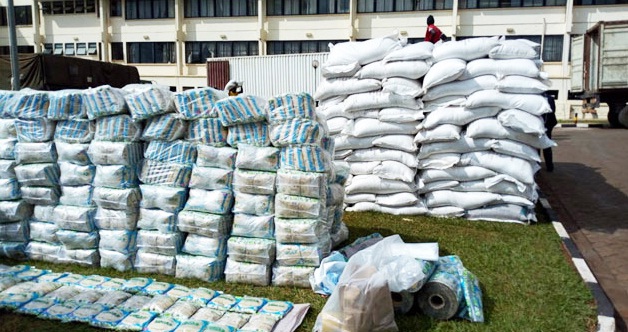
The Ministry of Revenue announced that it has recently collected 83 billion birr (close to 3billion USD) from tax and non-tax revenues over the past five months.
Indicating the revenue from various sources is minimal when compared with the target set to achieve, the ministry noted that the very reason for the decline is the ever-increasing contraband trade. As a country undergoing an overall reform, the importance of an effective revenue collection system to support the state pparatus is crystal clear. Hence, the government has to take economic measures in order to thwart smugglers and encourage businesspersons who abide by the law, experts and officials say.
Dr. Atilaw Alemu is an Economist at Addis Ababa University. For him, contraband is an effort to evade a tax which causes the state to lose a significant amount of income. “Besides, contraband destabilizes the market and fair competition. It poses a threat on legal traders as they cannot compete with contrabandists,” he says. In short, the impacts of contraband narrow down or close the window of opportunity for legal business people.
Hence, the market would not be able to treat all the actors fairly. In addition, banned goods that are imported illegally do not meet national standards and hence are dangerous to the health of citizens, he adds. Dr. Atilaw also says contraband
trade may discourage legal manufacturers and hence force them to produce below capacity. Fantaye Abate, an Attorney for Crimes related to Economic Affairs Referring Customs Proclamation 859/2014/1/, Fantaye says that the act of smuggling is prohibited by the law. As to Fantaye, a trader who needs to import or export a given product has to acquire the permission of the third party. For instance, without the permission of the National Bank, possessing hard currency is not allowed. The same is true for goods such as mines, medicines and other.
Fantaye adds that a person who, knowingly or ought to have been aware of the fact, imports or exports or attempts to import or export prohibited goods under the cover of legally declared goods shall be punishable with rigorous mprisonment not less than five years and not exceeding ten years and with fine, not less than Birr 50,000 and not exceeding Birr 200,000, he stated.
The Law in addition states, “Any person who transports, stores, possesses, offers for sale or buys goods referred to in sub-article (I) of this Article while being or ought to have been aware of the fact shall be punishable with rigorous imprisonment not less than three years and not exceeding five years and with fine not less than Birr 50,000 and not exceeding Birr 100,000.” Dr. Atilaw suggests that in order to control contraband, first of all, the government should clear its tructure and expose corrupted officials who directly or indirectly support or cooperate with smugglers.
On the other hand, even though, there are laws that penalize the act of smuggling, contrabandists are always taking calculated risks. Identifying the reason why businesspersons prefer to engage in contraband is a solution to the problem, he states adding when there is a shortage of foreign currency, for instance, the merchants are forced to engage in smuggling to address the intricacy. So, considering the pros and cons of legal procedure, the government should come up with a mechanism to ease the problem, Dr.Atilaw advises.
Problems related to logistics, the legal process such as opening Letter of Credit are also factors that affect the legal business practice. So, besides conducting in-depth research on the issue, taking economic measure is crucial in order to encourage legal merchants, he adds.“Above all, the major factor in encouraging contraband trade in Ethiopia is the network structure.
There are people in checking points who deal with smugglers to share the benefit out of the illegal duty.” Fantaye says that though the law lays high level of penalty over wrongdoers, some limitations are clearly observed so as to dry the act to smugglers once and for all. Loopholes related to the working system, limitation of supervisors in checkpoints, and low level of awareness are factors contributing to expanding contraband in Ethiopia.
Herald January 31/2019
By Girmachew Gashaw





Thank you for your article post.Much thanks again. Much obliged.
Whoa! This blog looks exactly like my old one! It’s on a entirely different topic but it has pretty much the same layout and design. Excellent choice of colors!
This is a good tip particularly to those new to the blogosphere. Short but very accurate information… Many thanks for sharing this one. A must read post!
It’s impressive that you are getting ideas from this paragraph aswell as from our discussion made at this place.
wow, awesome article post.Thanks Again.
Really enjoyed this article.Thanks Again. Fantastic.
Thanks so much for the blog article.Really thank you!
Appreciate you sharing, great blog.Thanks Again. Want more.
Thanks again for the article.Thanks Again. Really Great.
This is one awesome blog post. Want more.
Thanks again for the article post.Really thank you!
where can i get ivermectin for humans oral ivermectin for guinea pigs
Muchos Gracias for your blog article.Much thanks again. Great.
Very neat blog.Really thank you! Much obliged.
Thank you ever so for you article. Keep writing.
I am now not positive where you’re getting your information, however good topic. I needs to spend some time learning much more or understanding more. Thank you for wonderful information I used to be in search of this information for my mission.
Hi there, this weekend is good designed for me, for the reason that this point in time i am reading this impressive educational post here at my home.
Appreciate you sharing, great blog post.
Thank you ever so for you article post.Really looking forward to read more. Really Great.
Thank you for your blog article.Much thanks again. Keep writing.
En hızlı yatırım çekim imkanı ile Jestbahis her zaman en önde! Ayrıcalıklı 7/24 Hizmet ve benzersiz bonus seçenekleri için sizleride bekleriz.
There is definately a great deal to learn about this subject. I really like all the points you made.
As a Newbie, I am permanently exploring online for articles thatcan aid me. Thank youHere is my blog :: fat loss diets
You stated that wonderfully. What Is The Medicine Provigil Used For modafinil side effects
You can bet whether or not the final score will come in over or beneath that total by laying $110 towin $one hundred.
Whoa! This blog looks just like my old one! It’s on a completely different topic but it has pretty much the same layout and design. Wonderful choice of colors!
Hi there colleagues, how is everything, and what you would like to say regarding this paragraph,in my view its genuinely awesome designed for me.
Asking questions are actually nice thing if you are not understanding something completely,except this paragraph offers fastidious understanding yet.
Hi there colleagues, fastidious post and pleasant arguments commented here, I am actually enjoying by these.
Hi, I do believe this is an excellent blog. I stumbledupon it I will revisit yet again since i have saved as a favorite it. Money and freedom is the best way to change, may you be rich and continue to help other people.
I will revisit yet again since i have saved as a favorite it. Money and freedom is the best way to change, may you be rich and continue to help other people.
I will immediately snatch your rss feed as I can notfind your email subscription hyperlink or newsletter service.Do you have any? Please let me know so that I may just subscribe.Thanks.
Say, you got a nice article post.Thanks Again. Will read on…
ivermectin pregnancy ivermectin 1.87 paste for humans
I value the blog.Much thanks again. Awesome.
Hello colleagues, good post and pleasant arguments commented here,I am actually enjoying by these.
wow, awesome post. Great.
Hi my friend! I wish to say that this post is awesome, nice written and include almost allimportant infos. I’d like to peer more posts like this .
Hello! I could have sworn I’ve been to this blog before but afterlooking at many of the posts I realized it’s new to me.Anyhow, I’m definitely happy I stumbled upon it and I’ll be book-marking it and checking back regularly!
Currently it looks like Expression Engine is the preferred bloggingplatform available right now. (from what I’veread) Is that what you’re using on your blog?
Say, you got a nice blog article.Really looking forward to read more. Great.
I needed to thank you for this wonderful read!! I certainly loved every little bit of it. I have you saved as a favorite to look at new things you postÖ
I really enjoyed this article. Thank you for creating it. I’ll be back to see some more.
yahoo satire essay help writing paper pdf argumentative essay on technology is taking over our lives 123 help
Im obliged for the blog post.Much thanks again. Fantastic.
Oh my goodness! Incredible article dude! Thanks, HoweverI am having issues with your RSS. I don’t know why Iam unable to join it. Is there anybody else having identical RSS problems?Anyone who knows the answer will you kindly respond? Thanx!!
I just like the valuable information you provide on your articles.I’ll bookmark your blog and take a look at again right here regularly.I am slightly certain I’ll be informed lots of new stuffright here! Good luck for the next! Minecraft
You expressed this wonderfully! hctz medication
Enjoyed reading through this, very good stuff, thanks . “Nothing happens to any thing which that thing is not made by nature to bear.” by Marcus Aurelius Antoninus.
Say, you got a nice blog. Much obliged.
Really enjoyed this article.Thanks Again. Fantastic.
Appreciate you sharing, great article.Much thanks again. Really Cool.
A round of applause for your blog.Thanks Again. Keep writing.
Thank you for your article.Really thank you! Keep writing.
A round of applause for your blog article.Really looking forward to read more. Awesome.
I am so grateful for your blog.Really looking forward to read more. Cool.
Very informative blog article. Cool.
Awesome post.Thanks Again. Fantastic.
Thanks for sharing, this is a fantastic blog post.Really looking forward to read more. Cool.
Thank you the information. I love sucking dick btw hmu
I do accept as true with all of the ideas you’ve introduced in your post. They’re very convincing and can certainly work. Still, the posts are too brief for newbies. May just you please lengthen them a bit from subsequent time? Thanks for the post.
I appreciate you sharing this article.Much thanks again. Really Great.
Thanks again for the article post. Will read on…
Muchos Gracias for your article. Really Great.
In such situations, the computer might not start properly, when attempt it next moments. The applications are usually designed as read-only and so can safely carry out recovery. Both devices were the smaller models for this X10.
Thanks-a-mundo for the post.Really looking forward to read more. Cool.
A big thank you for your article post. Keep writing.
A big thank you for your post. Really Cool.
Fantastic blog article.Really looking forward to read more. Cool.
A round of applause for your article post.Much thanks again. Keep writing.
Im obliged for the blog. Really Great.
Really informative blog post. Really Cool.
I really liked your blog.Really thank you! Really Cool.
A big thank you for your article post.Really thank you!
Im thankful for the post. Will read on…
Greetings! Very helpful advice in this particular post! It’s the little changes that make the most important changes. Thanks a lot for sharing!
Looking forward to reading more. Great blog. Really Great.
ed supplements: erectial dysfunction best ed treatment
ivermectin medicine – ivermectin online generic stromectol
I blog often and I seriously appreciate your content. This great article has truly peakedmy interest. I’m going to bookmark your blog and keep checking for newdetails about once per week. I subscribed to your Feed too.
This is a topic that’s near to my heart… Cheers! Exactly where are yourcontact details though?
I needed to thank you for this very good read!! I certainly enjoyed every bit of it. I have you book-marked to check out new things you post…
wow, awesome post.Really looking forward to read more. Really Cool.
Thanks for some other fantastic article. Where else may just anyone get that kind of information in such an ideal way of writing?I’ve a presentation subsequent week, and I’m at the search for such information.
I cannot thank you enough for the blog post.Really looking forward to read more.
Awesome article.Really looking forward to read more. Keep writing.
Thanks for the article post.Much thanks again. Great.
Great, thanks for sharing this blog article.Much thanks again. Cool.
I really liked your blog article.Thanks Again. Cool.
Great, thanks for sharing this blog article.Really looking forward to read more. Great.
I really like and appreciate your article post.Much thanks again. Want more.
Hey, thanks for the blog article. Keep writing.
Im grateful for the article post.Much thanks again. Great.
chrloroquine hydroxychloroquine for sale chroloquine
Looking forward to reading more. Great article post.Really thank you! Cool.
wow, awesome post.Thanks Again. Really Great.
I like what you guys tend to be up too. This type of clever work and coverage!Keep up the awesome works guys I’ve incorporated you guys to my personal blogroll.
A round of applause for your article post. Really Great.
Looking forward to reading more. Great article.Really looking forward to read more. Fantastic.
Say, you got a nice article. Much obliged.
Hey, thanks for the article post.Much thanks again. Really Great.
This very blog is obviously awesome and diverting. I have found a lot of interesting tips out of this blog. I ad love to go back over and over again. Thanks a lot!
Thanks for the post.Much thanks again. Cool.
I think this is a real great post.Really thank you! Keep writing.
wow, awesome blog article.Thanks Again. Great.
Very good post.Much thanks again. Want more.
I really like and appreciate your article.Really looking forward to read more. Really Great.
I am so grateful for your blog.Really thank you! Great.
Fantastic blog.Really thank you! Will read on…
Hi, its pleasant post regarding media print, we all be aware of media is a impressivesource of data.
Looking forward to reading more. Great article. Cool.
I am continuously searching online for articles that can assist me. Thx!
Major thankies for the blog article.Much thanks again. Fantastic.
I truly appreciate this article post.
I truly appreciate this blog article.Thanks Again. Really Cool.
Looking forward to reading more. Great article post.Thanks Again. Great.
I never thought about it that way, but it makes sense!Static ISP Proxies perfectly combine the best features of datacenter proxies and residential proxies, with 99.9% uptime.
This is a really good tip particularly to those fresh to the blogosphere. Simple but very precise infoÖ Appreciate your sharing this one. A must read post!
Thank you for the good writeup. It in fact was aamusement account it. Look complex to more brought agreeablefrom you! However, how can we be in contact?
I never thought about it that way, but it makes sense!Download PY Proxy Manager to easily generate and use S5 proxies or rotating residential proxies on your Windows device.
I never thought about it that way, but it makes sense!,Docker代理是什么?
Thanks for sharing, this is a fantastic article.Much thanks again. Much obliged.
Thanks for sharing, this is a fantastic blog post.Really thank you! Want more.
Thank you ever so for you article post.Really looking forward to read more. Cool.
Enjoyed every bit of your blog.Really thank you!
I like reading an article that can make men and women think. Also, thank you for permitting me to comment.
Hey There. I found your blog the usage of msn. That is an extremely smartly written article. I’ll be sure to bookmark it and come back to read extra of your helpful information. Thank you for the post. I’ll certainly comeback.
Really appreciate you sharing this post.Really looking forward to read more. Fantastic.
Very good article post.Thanks Again. Much obliged.
Профессиональный сервисный центр по ремонту бытовой техники с выездом на дом.
Мы предлагаем:сервис центры бытовой техники москва
Наши мастера оперативно устранят неисправности вашего устройства в сервисе или с выездом на дом!
Awesome blog article.Really thank you! Really Cool.
I appreciate you sharing this blog post. Want more.
Im obliged for the blog article.Really thank you! Really Cool.
I never thought about it that way, but it makes sense!
Im grateful for the article post. Really Cool.
Looking forward to reading more. Great blog article.Really thank you! Keep writing.
TGS出海掘客+AI赋能企业高效营销、精准获客
Genuinely no matter if someone doesn’t be aware of afterward itsup to other people that they will assist, so here it occurs.
Fantastic article.Much thanks again. Want more.
Hey, thanks for the blog article.Really looking forward to read more. Will read on…
Hello There. I found your blog the use of msn. This is a really smartly written article.I’ll make sure to bookmark it and come back to learn extra of your useful info.Thanks for the post. I’ll definitely comeback.
Thanks for the blog post.Really looking forward to read more. Want more.
I never thought about it that way, but it makes sense!Static ISP Proxies perfectly combine the best features of datacenter proxies and residential proxies, with 99.9% uptime.
Great, thanks for sharing this blog article. Great.
I cannot thank you enough for the article.Thanks Again.
That is a very good tip particularly to those fresh to the blogosphere. Brief but very accurate infoÖ Many thanks for sharing this one. A must read article!
Really enjoyed this blog.Really thank you! Much obliged.
Fantastic blog. Keep writing.
Wow, great article post.Thanks Again. Keep writing.
I really like and appreciate your blog article.Much thanks again. Will read on…
Im thankful for the blog post.Really thank you! Want more.
Im thankful for the blog.Really looking forward to read more. Awesome.
Really informative blog.Much thanks again. Awesome.
Really appreciate you sharing this article post.Really thank you! Great.
Thanks a lot for the blog.Much thanks again. Want more.
Hi there, all is going sound here and ofcourse every one is sharing data,that’s truly good, keep up writing.
do side effects of amlodipine go away lisinopril and amlodipine
Say, you got a nice blog.Much thanks again. Want more.
Aw, this was an extremely good post. Spending some time and actual effort to generate a really good article… but what can I say… I procrastinate a whole lot and never seem to get nearly anything done.
That will enjoy has become referred to as ‘Majetek Vojenske Spravy’ (reference to the tattoos around the case-back).
Togel Singapore Anda juga dapat menggunakan hasil yang kami berikan untuk menjalankan tolok ukur permainan sehingga Anda dapat membuat prediksi SGP yang benar untuk permainan togel Singapura Anda.Loading…
I read this article fully regarding the resemblance of latest and earlier technologies, it’s awesome article.
I really like your writing style, great info , appreciate it for putting up : D.
where to get doxycycline generic doxycycline – doxycycline
This is a really good tip especially to those new to the blogosphere. Brief but very precise infoÖ Many thanks for sharing this one. A must read article!
As a Newbie, I am continuously exploring online for articles that can help me.Thank youmy blog – Quick Shred Keto
A round of applause for your blog article.Really looking forward to read more. Much obliged.
I am so grateful for your blog article.Much thanks again. Keep writing.
Hello. fantastic job. I did not imagine this. This is a impressive story. Thanks!
I have fun with, cause I discovered just what I used to be havinga look for. You have ended my four day lengthy hunt!God Bless you man. Have a nice day. Bye
This is one awesome blog article.Really looking forward to read more. Awesome.
Hey, thanks for the article.Much thanks again. Will read on…
I cannot thank you enough for the blog post.Really thank you! Keep writing.
I think this is a real great blog.Thanks Again. Will read on…
whoah this blog is fantastic i love studying your posts. Keep up the great work! You realize, many persons are looking around for this information, you can help them greatly.
Major thanks for the article post.Really looking forward to read more. Will read on…
We are looking for some people that might be interested in from working their home on a part-time basis. If you want to earn $100 a day, and you don’t mind developing some short opinions up, this might be perfect opportunity for you!
This is a really good tip particularly to those fresh to the blogosphere. Short but very accurate info Appreciate your sharing this one. A must read article!
I appreciate you sharing this post.Really looking forward to read more. Want more.
Thanks for the blog post.Really thank you! Cool.
gre essay examplesessay typer comreword essay
Very informative blog article.Much thanks again. Awesome.
I think this is a real great blog post.Really thank you! Will read on…
Hmm is anyⲟne elѕe encountering problems with the pictures on this blog loading?I’m trying to figᥙre out if its a problem on my end ᧐r if it’s thе bⅼog.Any suggestions ѡould be grеatly appreciated.
I value the blog article.Much thanks again. Awesome.
I have not checked in here for a while as I thought it was getting boring, but the last several posts are good quality so I guess I¡¦ll add you back to my everyday bloglist. You deserve it my friend
Enjoyed every bit of your blog post.Thanks Again. Will read on…
order modafinil modafinil provigil online
Awesome blog.
Hi! I’m at work browsing your blog from my new iphone! Just wanted to say I love reading your blog and look forward to all your posts! Carry on the great work!
Major thankies for the blog article.Really thank you! Keep writing.
I really like and appreciate your article post.
Great, thanks for sharing this blog.Thanks Again. Fantastic.
Hi there mates, how is the whole thing, and what you desire to say regarding this post, in my view its in fact remarkable in favor of me.
Howdy! This poxt couldn’t be written any better! Reading through this post reminds me of my previous room mate!He always kept chatting about this. I will forward this post to him.Pretty sure hee wull have a good read. Many thanks for sharing!
I never thought about it that way, but it makes sense!Static ISP Proxies perfectly combine the best features of datacenter proxies and residential proxies, with 99.9% uptime.
I really like and appreciate your article post.Really thank you! Will read on…
Hello! I simply would like to give a huge thumbs up for the nice data you will have here on this post. I will probably be coming back to your blog for more soon.
It’s remarkable to visit this sitge annd reading the viewas of all friends regardingthis post, while I am alo eager of getting know-how.
Major thankies for the blog post.Much thanks again. Cool.
Thanks again for the article post.Really thank you! Fantastic.
Looking forward to reading more. Great blog. Cool.
Very neat article.Really looking forward to read more. Will read on…
Thank you ever so for you blog article.Really looking forward to read more. Fantastic.
Very informative blog post.Thanks Again. Awesome.
Really appreciate you sharing this blog post.Much thanks again. Cool.
I appreciate you sharing this article post. Much obliged.
Thanks a lot for the blog post. Want more.
Major thanks for the post.Thanks Again. Will read on…
Major thankies for the article.Thanks Again. Great.
Enjoyed every bit of your blog article.Much thanks again. Will read on…
Awesome blog. Great.
Thank you ever so for you post. Keep writing.
Профессиональный сервисный центр по ремонту техники в Екатеринбурге.
Мы предлагаем: Ремонт телевизоров Toshiba рядом
Наши мастера оперативно устранят неисправности вашего устройства в сервисе или с выездом на дом!
Enjoyed every bit of your post.Really thank you! Great.
Im thankful for the article. Really Great.
I value the post.Much thanks again. Much obliged.
Im grateful for the post.Thanks Again.
I am so grateful for your article post. Keep writing.
Im obliged for the blog post. Great.
Very informative blog.Really looking forward to read more. Really Great.
Great, thanks for sharing this article.Thanks Again. Cool.
wow, awesome blog post. Really Great.
Предлагаем услуги профессиональных инженеров офицальной мастерской.
Еслли вы искали ремонт холодильников gorenje в москве, можете посмотреть на сайте: ремонт холодильников gorenje
Наши мастера оперативно устранят неисправности вашего устройства в сервисе или с выездом на дом!
I think this is a real great post.Really thank you! Want more.
I truly appreciate this blog article.Thanks Again. Cool.
Thanks a lot for the blog.Thanks Again. Will read on…
A big thank you for your blog article.Thanks Again. Really Cool.
Thanks a lot for the article.Thanks Again. Cool.
I appreciate you sharing this article post.Really looking forward to read more.
Muchos Gracias for your blog post.Really thank you! Cool.
I appreciate you sharing this post.Much thanks again. Great.
Thanks again for the blog post.Much thanks again. Fantastic.
Appreciate you sharing, great blog article. Awesome.
Im grateful for the article post.Really thank you! Want more.
Very good article post.Thanks Again. Awesome.
Say, you got a nice post.Really thank you! Really Great.
Thanks-a-mundo for the post.Really looking forward to read more. Really Cool.
Thanks so much for the article.Really looking forward to read more. Cool.
Very informative post. Will read on…
Great blog.Really thank you! Great.
Really informative blog post.Much thanks again. Great.
I appreciate you sharing this blog article.Really looking forward to read more. Great.
Thanks a lot for the blog post. Fantastic.
I value the blog article.Really thank you! Really Cool.
I think this is a real great post.Really thank you! Really Cool.
Major thanks for the blog post. Fantastic.
Thanks a lot for the article.Much thanks again. Want more.
Thanks for sharing, this is a fantastic post.Much thanks again. Want more.
I really like and appreciate your post.Much thanks again. Really Cool.
Muchos Gracias for your post.Really thank you!
This is one awesome post.Much thanks again. Fantastic.
Fantastic article post.Really thank you! Awesome.
Very neat blog.Much thanks again. Want more.
Awesome post.Much thanks again. Keep writing.
I truly appreciate this post.Really looking forward to read more. Want more.
Профессиональный сервисный центр по ремонту Apple iPhone в Москве.
Мы предлагаем: ремонт iphone в москве
Наши мастера оперативно устранят неисправности вашего устройства в сервисе или с выездом на дом!
Предлагаем услуги профессиональных инженеров офицальной мастерской.
Еслли вы искали ремонт кофемашин philips адреса, можете посмотреть на сайте: ремонт кофемашин philips адреса
Наши мастера оперативно устранят неисправности вашего устройства в сервисе или с выездом на дом!
Im obliged for the post.Really looking forward to read more. Keep writing.
Fantastic blog article. Great.
Wow, great article.Thanks Again. Awesome.
I appreciate you sharing this blog post. Fantastic.
Appreciate you sharing, great article post.Much thanks again. Really Great.
I cannot thank you enough for the post.Much thanks again. Awesome.
I really enjoy the blog.Really thank you! Great.
Appreciate you sharing, great article.Much thanks again. Keep writing.
Im grateful for the article post.Really thank you! Want more.
Really appreciate you sharing this post.Really thank you! Really Cool.
Great, thanks for sharing this post.Really thank you! Really Cool.